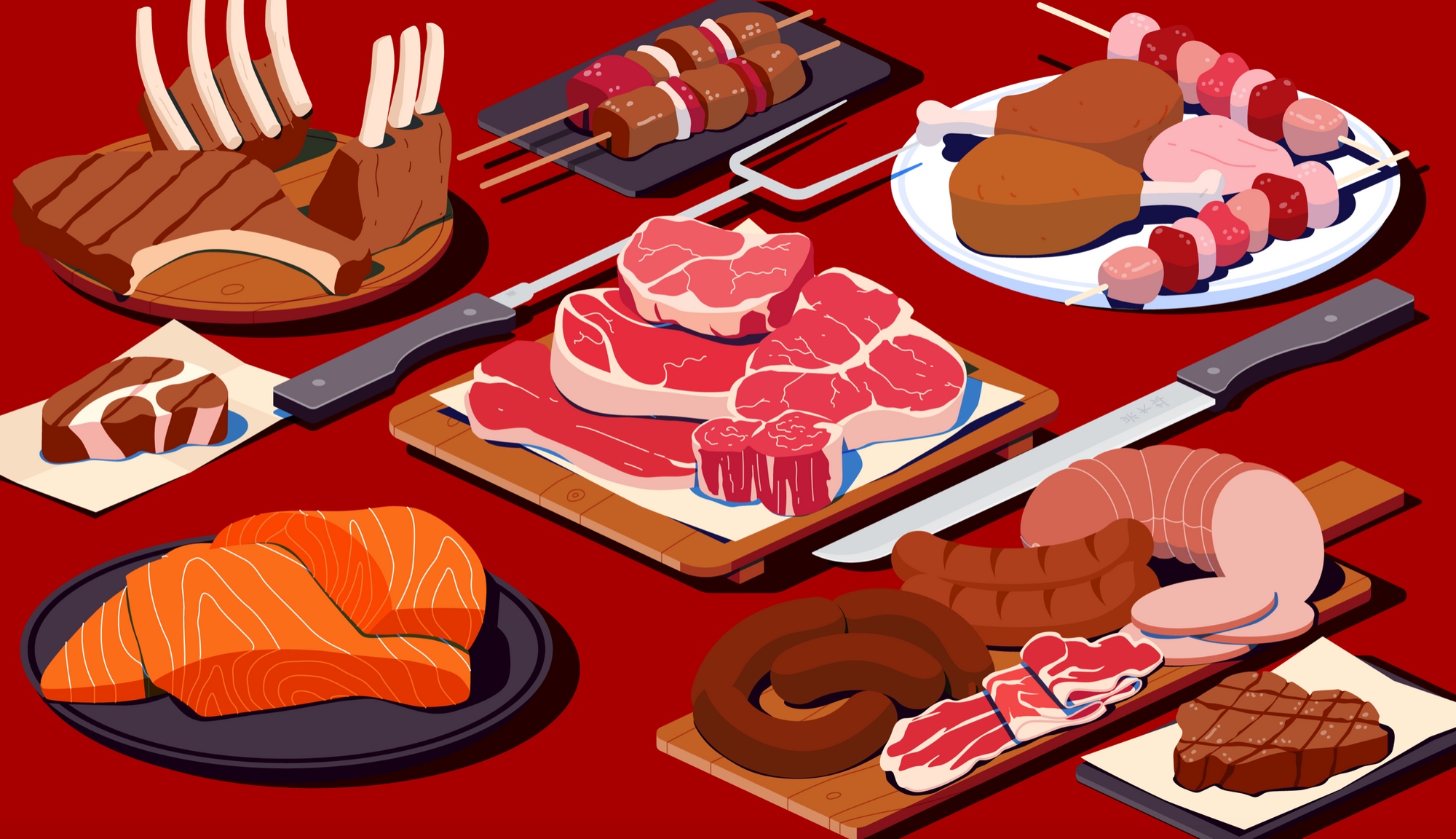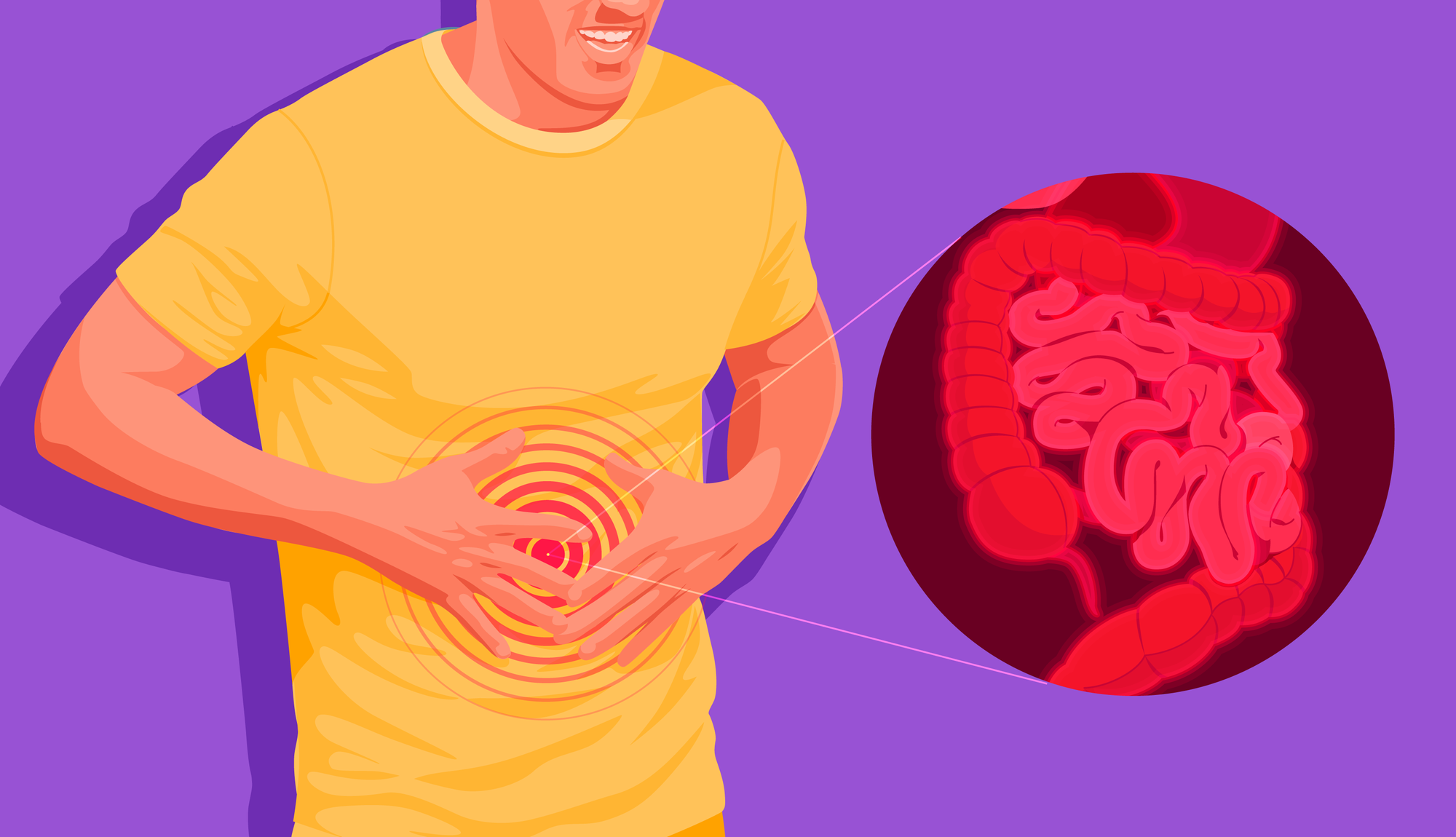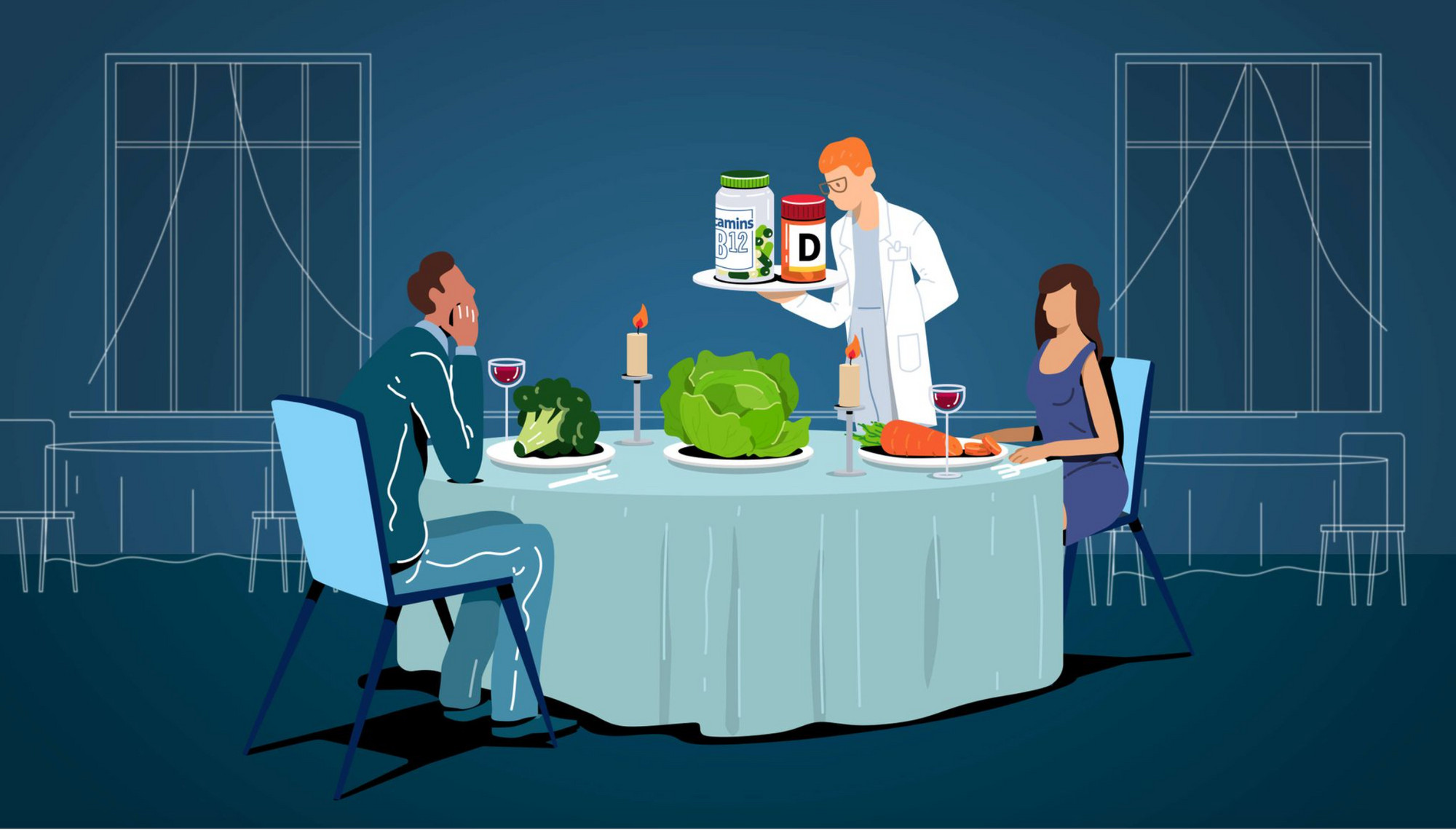Numerous studies have associated a high intake of red and processed meat with an increased risk for bowel cancer. So is it safe to eat red meat, and, if so, how much is too much? In honour of Bowel Cancer Awareness Month, we explore the link and offer actionable, evidence-based guidance.
Table of contents
- What is red and processed meat?
- The link between red meat, processed meat and bowel cancer
- How does red and processed meat influence cancer risk?
- Can grilling meat increase cancer risk?
- What can you do to minimise cancer risk?
- Top tips for reducing red and processed meat consumption
- Final word
What is processed and red meat?
Red meat includes all mammalian muscle meat, including pork, beef, lamb, veal, horse and goat. Due to their haem content, these types of meat are a dark red when raw. Red meat does not include rabbit and poultry such as turkey, duck, goose or game birds.
Processed meat refers to any food item that has been smoked, salted, cured or undergone some other process to enhance flavour and longevity. Examples include:
- beef jerky
- ham
- bacon
- hot dogs
- chorizo
- prosciutto
- corned beef
The link between red meat, processed meat and bowel cancer
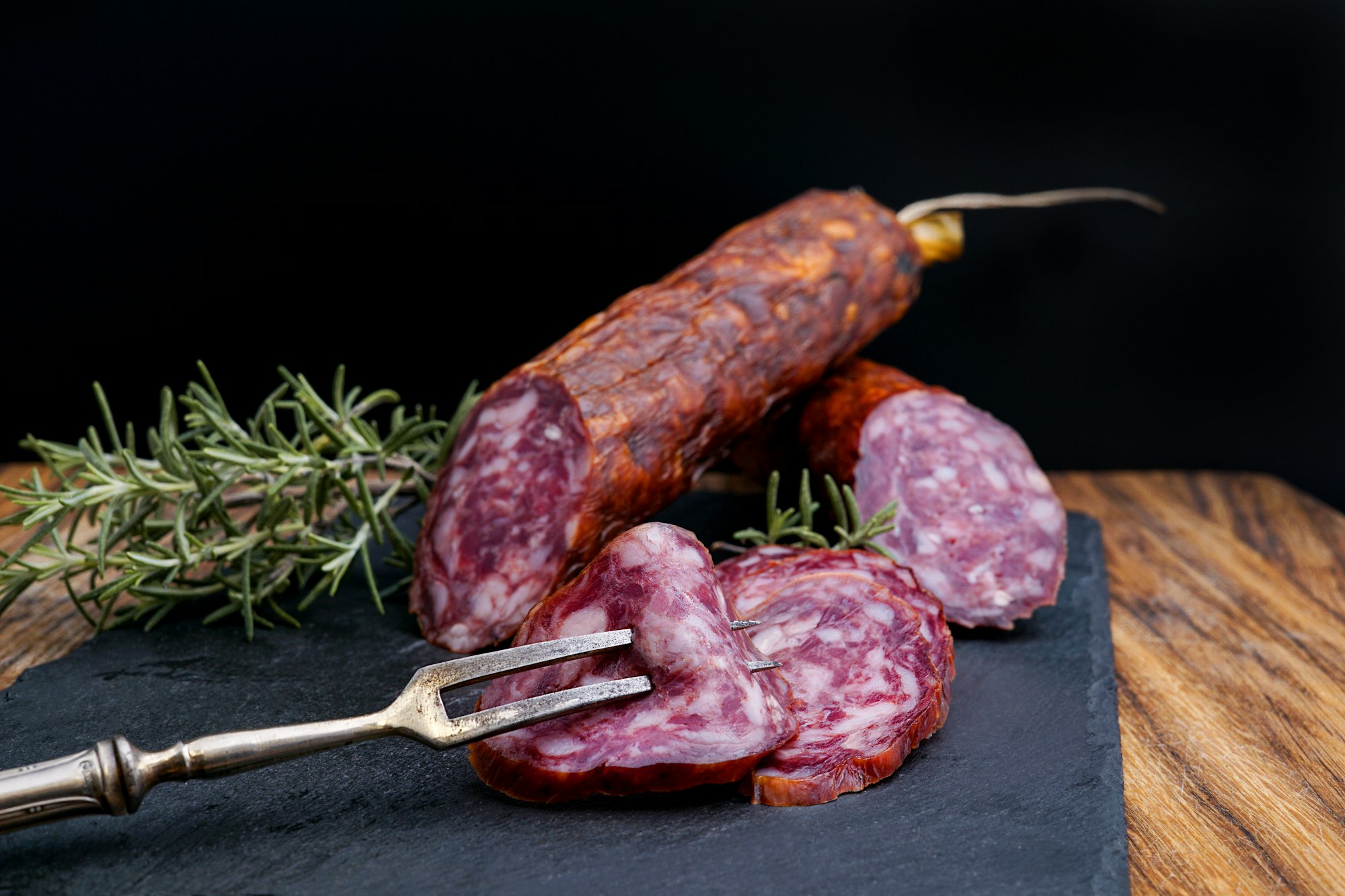
In 2015, the International Agency For Research On Cancer (IARC), part of the World Health Organisation, published a landmark paper in the peer-reviewed journal Lancet Oncology.
Based on a review of over 800 studies, the expert panel categorised processed meat as “definitely carcinogenic” (cancer-causing), whilst red meat was placed one category below as “probably carcinogenic”.
Simply put, the expert panel deemed the epidemiological evidence convincing enough to say that processed meat can cause colorectal cancer.
As for red meat, “probably carcinogenic” means that there is a strong body of evidence linking red meat with colorectal cancer. However, further studies are needed to rule out confounding variables such as bias.
Upon publication, the paper met with objections from certain groups, not least of which those in the meat industry. In particular, they objected to processed meat being in the same category as compounds like tobacco.
Professor David Phillips, an oncology expert, explains this with a simple analogy; banana skins can definitely cause accidents, even if they rarely do.
Moreover, accidents via banana skins are often less severe than those sustained in road traffic accidents, though both cars and banana skins can definitely cause injuries.
On the IARC categorisation scale, both would be in the same group, but this doesn't mean they are equally harmful to health. Likewise, processed meats sit in the same category as plutonium and tobacco, but the rates at which they cause cancer are significantly different.
For comparison, 86% of lung cancers are attributed to tobacco, whilst researchers have estimated that about 21% of bowel cancers are due to excessive consumption of red and processed meat (assuming red meat is causally associated with bowel cancer, which the IARC didn't conclude).
In other words, whilst the evidence that processed meat can cause cancer is as strong as that for tobacco, the risk from smoking is significantly higher.
How do processed and red meats cause cancer?
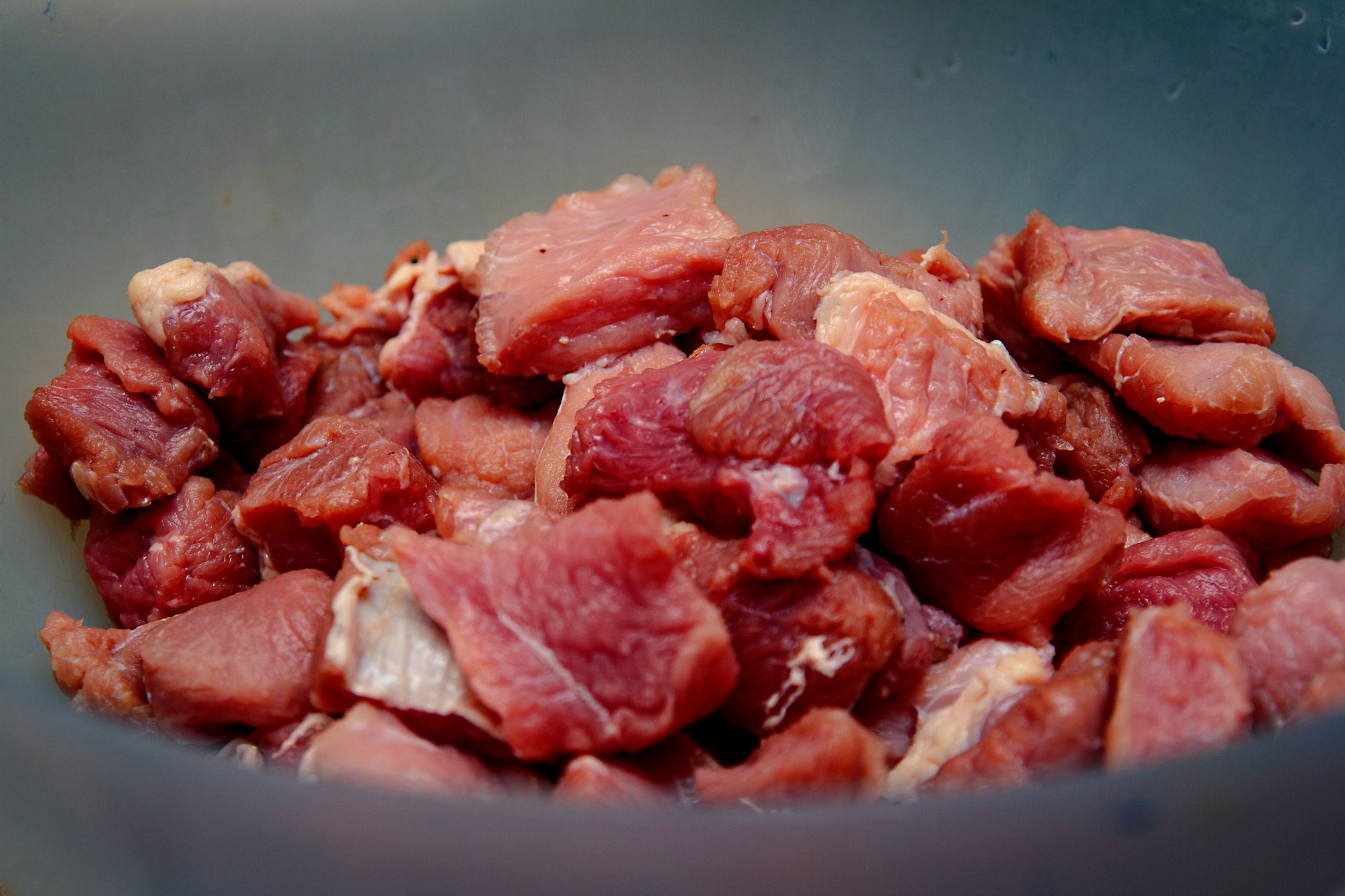
Processed and red meats contain carcinogenic chemicals, some added and others naturally occurring.
More specifically, red meat contains a compound called haem- this is what gives red meat its colour and name. When metabolised by gut bacteria, haem can form N-nitroso, a cancer-causing compound that damages the bowel wall, potentially causing cancer.
As for processed meats, these contain two types of added preservatives, namely nitrites and nitrates. When digested, these chemicals can also form N-nitroso, damaging cells in the bowel lining and increasing your risk of colorectal cancer.
Can grilling meat increase cancer risk?

When meat is cooked at high temperatures or by direct flame, an increased amount of carcinogenic compounds are formed, particularly in red and processed meats.
More specifically, flame broiling and barbecuing can increase the amounts of polycyclic aromatic hydrocarbons (PAH) and heterocyclic amines (HCA), two compounds that can cause DNA damage.
Numerous epidemiological studies indicate a link between high consumption of well-done or barbecued foods and risk of bowel, pancreatic and prostate cancer. With that said, other studies have found little or no association between colorectal or prostate cancer and grilled meat intake.
In light of the growing research, the National Cancer Institute (NCI) released a fact sheet on PAH and HAA in relation to cancer risk.
Whilst they acknowledge that numerous studies have found an association between the two, they conclude that “population studies have not established a definitive link between HAA and PAH exposure from cooked meats and cancer in humans.”
Nonetheless, the NCI offers a few recommendations to minimise dietary HCA and PAH exposure, such as:
-
Flip meat frequently when flame broiling instead of leaving it to sit.
-
When preparing meat, avoid prolonged cooking times at high heat and minimise the contact of the meat with direct flame.
-
Remove charred portions of meat and avoid using meat drippings to make gravy.
-
Prepare the meat in a microwave oven before finishing on a flame grill to minimise HCA exposure.
The IARC working group concluded that they had insufficient data to determine whether the meat preparation method affects cancer risk.
What can you do to minimise your risk?

According to the NHS, those consuming more than 90 grams of processed or red meat a day should cut down to 70 grams or less in order to reduce their risk of bowel cancer.
The World Cancer Research Fund recommends eating no more than three portions a week, which works out at around 300-500 grams a week, cooked weight.
According to a study looking at over half a million UK adults over seven years, even moderate consumption (79 grams daily) of red and processed meat slightly increases cancer risk.
In other words, 45 of 10,000 people who ate 11 grams of red and processed meat daily developed bowel cancer, compared to 59 0f 10,000 of those eating 79 grams daily. With this in mind, it may be wise to consume a little less than the 70 grams daily recommendation.
To help you visualise these amounts, the NHS has listed the average red and processed meat content in common meals:
Grilled 8oz beef steak – 163g
A slice of ham – 23g
Three thin-cut cuts of roast lamb, beef or pork, each about the size of half a slice of sliced bread – 90g
Cooked breakfast (2 standard British sausages, around 9cm long, and 2 thin-cut rashers of bacon) – 130g
Large doner kebab – 130g
5oz rump steak – 102g
As for processed foods, it is best to eat very little of these foods as they are often high in salt and fat. The odd bacon bap or sausage sarnie is unlikely to cause much harm, especially relative to other risks like smoking.
With that said, eat processed foods sparingly, if at all; according to a meta-analysis of ten papers, each 50-gram portion of processed meat eaten daily increases the risk of colorectal cancer by about 18%.
Simply put, the less processed food you eat, the lower your risk of bowel cancer
If we assume that the link between red meat and colorectal cancer is causal, the same study suggests that every 100-gram portion of red meat daily would increase bowel cancer risk by 17%. Let me reiterate that the WHO study deemed causation probable but not definite, pending further studies.

Top tips for reducing red and processed meat consumption
We have compiled a few simple steps you can take to minimise your consumption of red and processed meats, thereby reducing your risk of bowel cancer.
1.) Bulk your meals out with vegetables.
Add plenty of legumes and extra veggies to bulk out meals whilst reducing red and processed meat.
For instance, minimise the amount of minced beef in your bolognese sauce and add texture with aubergine, carrots and beans. If you have a full English breakfast, add extra mushrooms or tomatoes in favour of extra sausages or bacon rashers.
2.) Substitute red and processed meat with chicken or fish.
Try substituting red and processed meat for poultry and fish; for example, swap steak pie for a chicken or fish pie and steak tacos for shrimp ones.
3.) Reduce your portion sizes when eating red meat.
If you cook an English breakfast, have one rasher of bacon instead of two and likewise with sausages.
This simple change can reduce the amount of red and processed meat in the meal from 130g to 65g, just below the daily recommended guidance.
4.) Have a meat-free day or days each week.
Set aside a couple of meat-free days each week and try eating veggie alternatives to your favourite meals.
This might mean eating a veggie pattie over a beef burger or switching a ham wrap for a falafel one.
Final word
To summarise, red meat is a good source of protein, zinc and iron and can play a part in a healthy, balanced diet.
With that said, moderation is key, and you shouldn’t eat more than three portions a week. When you do eat red meat, go for unprocessed, lean cuts and trim the fat.
The UK guidelines suggest that those eating over 90 grams of processed or red meat each day should cut down to 70 or less.
Whilst the current research does not permit us to say how much is “too much”, research consistently shows that the less red and processed meat you consume, the lower your risk of bowel cancer.
Even moderate intake raises your risk, with those consuming 79 grams of red and processed meat each day experiencing a 32% increased risk of bowel cancer than those consuming 11 grams.
As for processed foods, eat them sparingly, if at all. Ultimately, the less processed food you eat, the lower your risk of bowel cancer.
Last but not least, besides cutting down on red and processed meat, make sure you eat plenty of fibre, whole grains, fruit, nuts, vegetables and legumes. By doing so, you can reduce your risk of bowel cancer and improve your overall health.
☝️DISCLAIMER☝This article is for informational purposes only. It is not intended to constitute or be a substitute for professional medical advice, diagnosis, or treatment.


